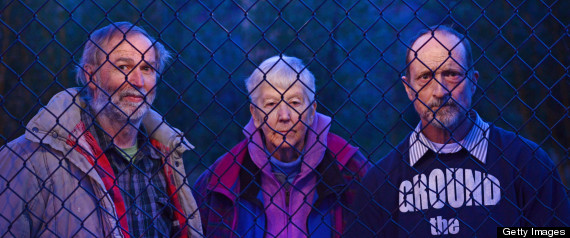In another case of possible overreach by federal prosecutors, an 82-year-old nun and two anti-nuclear activists face long prison terms after being convicted of "sabotage against the U.S. government" and other serious felonies. In truth, the three trespassed onto a nuclear facility, and damaged and vandalized some government property. Their most serious offense may have been to expose lapses in federal security at a nuclear weapons production facility.
In June of last year, peace activists Sister Megan Rice, 82, Greg Boertje-Obed, 57, and Michael Walli, 63, were able to access the Highly Enriched Uranium Materials Facility at the Y-12 nuclear weapons plant in Oak Ridge, Tenn., simply by cutting through a series of chain-link fences. The three then unfurled banners, spray-painted on the building, sang hymns and prayed until security finally arrived to arrest them.
As the activist site Common Dreams reports, over the next several months federal prosecutors applied increasingly serious charges to the activists, and this month ultimately convicted them of serious felonies that could carry long prison sentences. The three were convicted of "crimes of violence," and will remain incarcerated until their sentencing in September, though the group didn't harm anyone and carried with them messages of peace and nonviolence.
The severity of the charges may be more of a response to the public embarrassment the break-in caused for the Obama administration than to actual criminal culpability. In reporting on the case last August, for example, The New York Times reported that nuclear experts were calling the protest "the biggest security breach in the history of the nation’s atomic complex." The paper called the fiasco a "huge embarrassment for President Obama," and said that the three protesters had "made nuclear theft seem only a little more challenging than a romp in the Tennessee woods."
The case is the latest of several -- including the January suicide of Internet activist Aaron Swartz -- to demonstrate the immense charging power of prosecutors. Some critics say these cases show an out-of-control federal justice system that allows politically motivated prosecutors to use criminal sanctions to target critics, make examples of protesters, or discourage those who seek to expose government lapses, abuses, and oversights.
Original Article
Source: huffingtonpost.com
Author: Radley Balko
In June of last year, peace activists Sister Megan Rice, 82, Greg Boertje-Obed, 57, and Michael Walli, 63, were able to access the Highly Enriched Uranium Materials Facility at the Y-12 nuclear weapons plant in Oak Ridge, Tenn., simply by cutting through a series of chain-link fences. The three then unfurled banners, spray-painted on the building, sang hymns and prayed until security finally arrived to arrest them.
As the activist site Common Dreams reports, over the next several months federal prosecutors applied increasingly serious charges to the activists, and this month ultimately convicted them of serious felonies that could carry long prison sentences. The three were convicted of "crimes of violence," and will remain incarcerated until their sentencing in September, though the group didn't harm anyone and carried with them messages of peace and nonviolence.
The severity of the charges may be more of a response to the public embarrassment the break-in caused for the Obama administration than to actual criminal culpability. In reporting on the case last August, for example, The New York Times reported that nuclear experts were calling the protest "the biggest security breach in the history of the nation’s atomic complex." The paper called the fiasco a "huge embarrassment for President Obama," and said that the three protesters had "made nuclear theft seem only a little more challenging than a romp in the Tennessee woods."
The case is the latest of several -- including the January suicide of Internet activist Aaron Swartz -- to demonstrate the immense charging power of prosecutors. Some critics say these cases show an out-of-control federal justice system that allows politically motivated prosecutors to use criminal sanctions to target critics, make examples of protesters, or discourage those who seek to expose government lapses, abuses, and oversights.
Original Article
Source: huffingtonpost.com
Author: Radley Balko

No comments:
Post a Comment